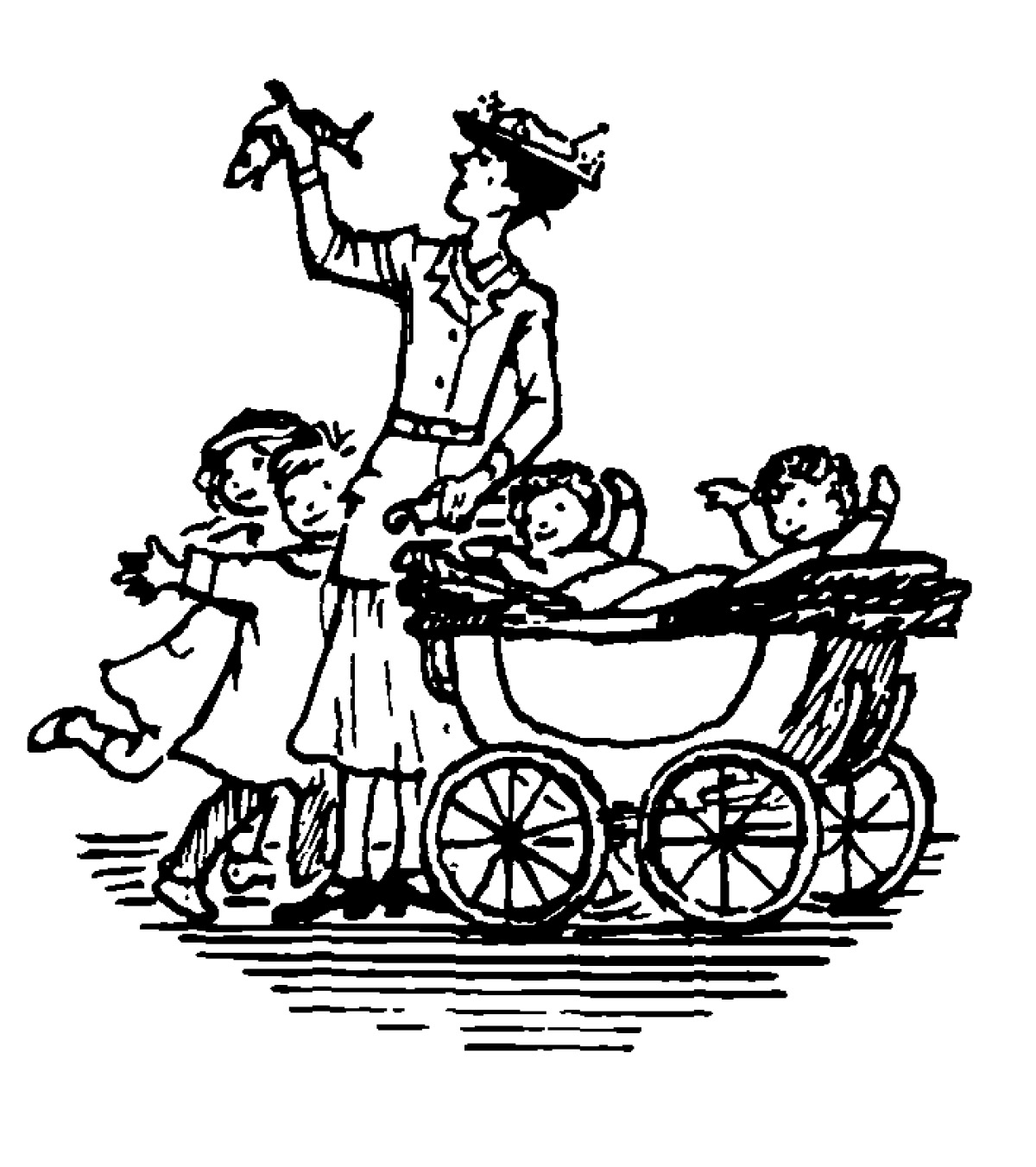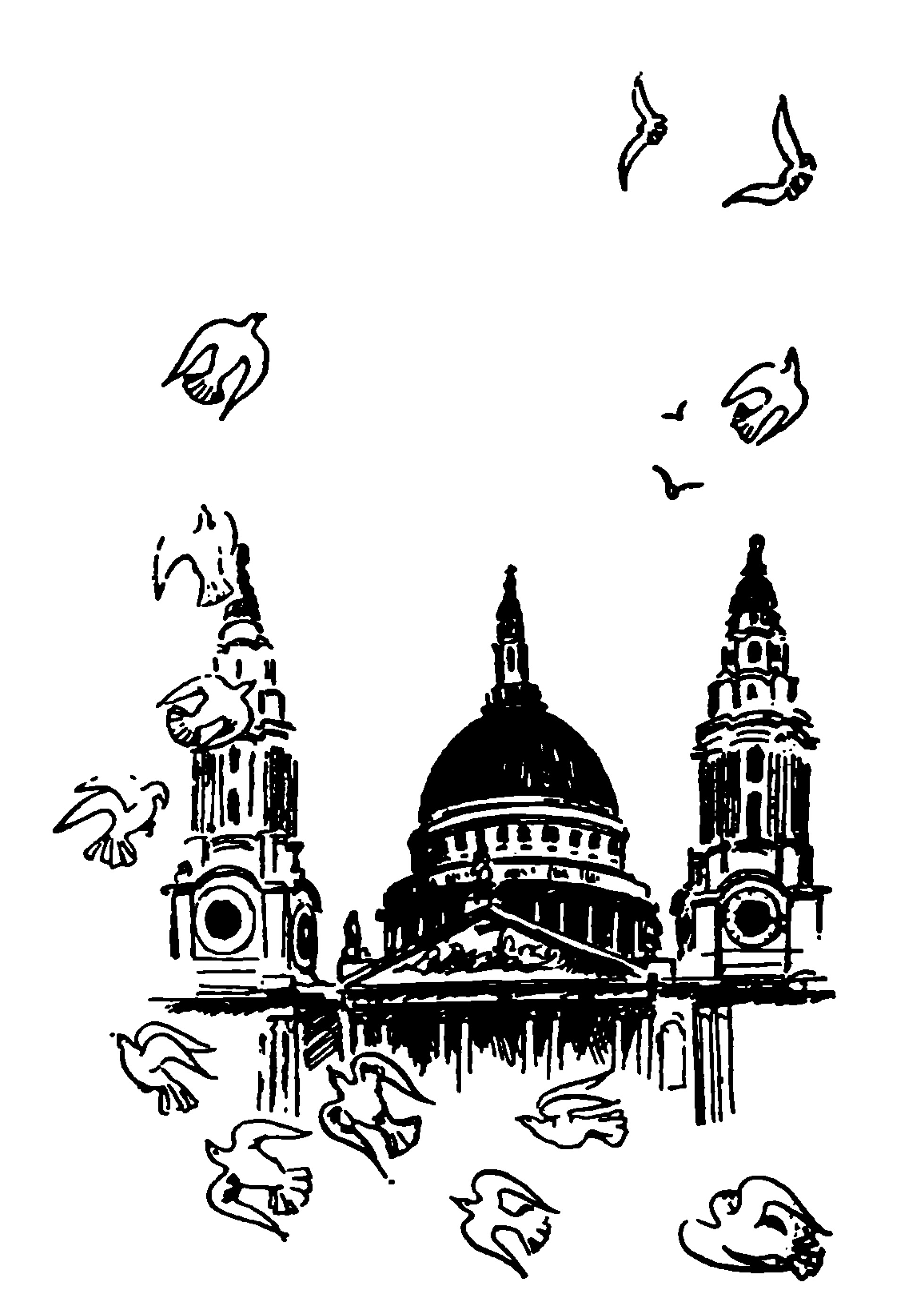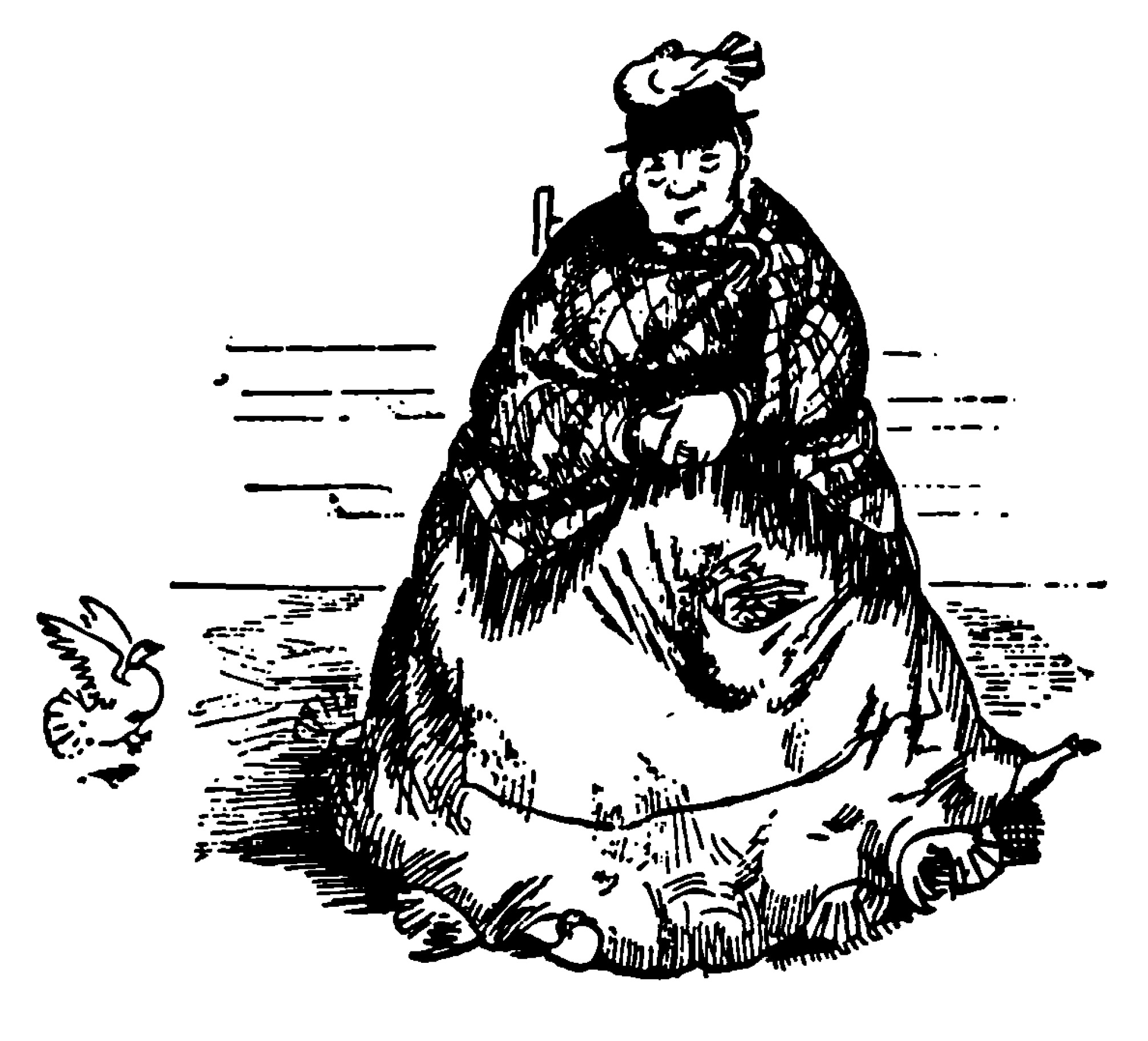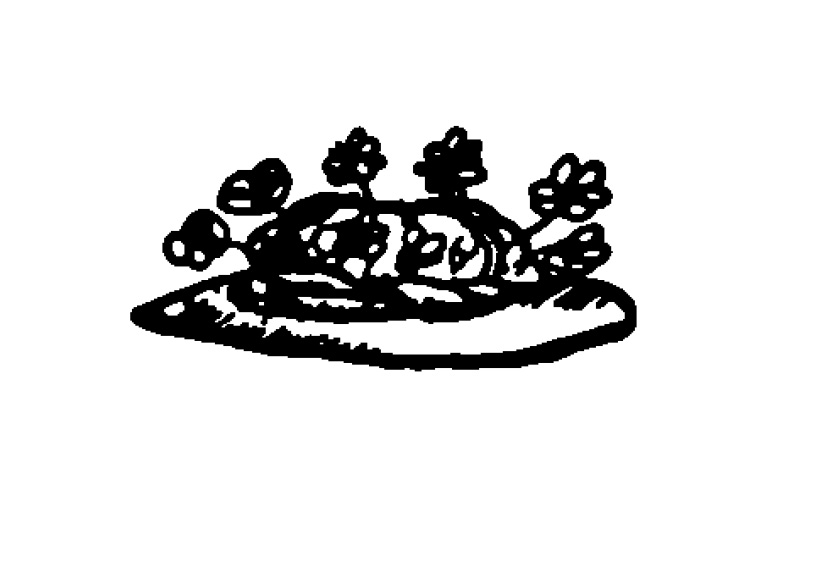Mary Poppins (7 page)
Authors: P. L. Travers

Again the world went spinning round them — or were they spinning round the world? And then, whichever it was ceased.
They found themselves in a grassy clearing surrounded by bamboo trees. Green paperlike leaves rustled in the breeze. And above that quiet swishing they could hear a steady rhythmic sound — a snore, or was it a purr?
Glancing round, they beheld a large furry shape — black with blotches of white, or was it white with blotches of black? They could not really be sure.
Jane and Michael gazed at each other. Was it a dream from which they would wake? Or were they seeing, of all things, a Panda! And a Panda in its own home and not behind bars in a zoo.
The dream, if it was a dream, drew a long breath.
"Whoever it is, please go away. I rest in the afternoon."
The voice was as furry as the rest of him.
"Very well, then, we
will
go away. And then perhaps" — Mary Poppins's voice was at its most priggish—"you'll be sorry you missed us."
The Panda opened one black eye. "Oh, it's you, my dear girl," he said sleepily. "Why not have let me know you were coming? Difficult though it would have been, for
you
I would have stayed awake." The furry shape yawned and stretched itself. "Ah well, I'll have to make a home for you all. There wouldn't be enough room in mine." He nodded at a neat shelter made of leaves and bamboo sticks. "But," he added, eying the herring, "I will not allow that scaly seathing under any roof of mine. Fishes are far too fishy for me."
"We shall not be staying," Mary Poppins assured him. "We're taking a little trip round the world and just looked in for a moment."
"What nonsense!" The Panda gave an enormous yawn. "Traipsing wildly round the world when you could stay here with me. Never mind, my dear Mary, you always do what you want to do, however absurd and foolish. Pluck a few young bamboo shoots. They'll sustain you till you get home. And you two" — he nodded at Jane and Michael—"tickle me gently behind the ears. That always sends me to sleep."
Eagerly they sat down beside him and stroked the silky fur. Never again — they were sure of it — would they have the chance of stroking a Panda.
The furry shape settled itself, and as they stroked, the snore — or the purr — began its rhythm.
"He's asleep," said Mary Poppins softly. "We mustn't wake him again." She beckoned to the children, and as they came on tip-toe towards her, she gave a flick of her wrist. And the compass, apparently, understood, for the spinning began again.
Hills and lakes, mountains and forests went waltzing round them to unheard music. Then again the world was still, as if it had never moved.
This time they found themselves on a long white shore, with wavelets lapping and curling against it.
And immediately before them was a cloud of whirling, swirling sand from which came a series of grunts. Then slowly the cloud settled, disclosing a large black and grey Dolphin with a young one at her side.
"Is that you, Amelia?" called Mary Poppins.
The Dolphin blew some sand from her nose and gave a start of surprise. "Well, of all people, it's Mary Poppins! You're just in time to share our sand-bath. Nothing like a sand-bath for cleansing the fins and the tail."
"I had a bath this morning, thank you!"
"Well, what about those young ones, dear? Couldn't they do with a bit of scouring?"
"They have no fins and tails," said Mary Poppins, much to the children's disappointment. They would have liked a roll in the sand.
"Well, what on earth or sea are you doing here?" Amelia demanded briskly.
"Oh, just going round the world, you know," Mary Poppins said airily, as though going round the world was a thing you did every day.
"Well, it's a treat for Froggie and me — isn't it, Froggie?" Amelia butted him with her nose, and the young Dolphin gave a friendly squeak.
"I call him Froggie because he so often strays away — just like the Frog that would a-wooing go, whether his mother would let him or no. Don't you, Froggie?" His answer was another squeak.
"Well, now for a meal. What would you like?" Amelia grinned at Jane and Michael, displaying a splendid array of teeth. "There's cockles and mussels alive, alive-O. And the seaweed here is excellent."
"Thank you kindly, I'm sure, Amelia. But we have to be home in half a minute." Mary Poppins laid a firm hand on the handle of the perambulator.
Amelia was clearly disappointed.
"Whatever kind of visit is that? Hullo and good-bye in the same breath. Next time you must stay for tea, and we'll all sit together on a rock and sing a song to the moon. Eh, Froggie?"
Froggie squeaked.
"That will be lovely," said Mary Poppins, and Jane and Michael echoed her words. They had never yet sat on a rock and sung a song to the moon.
"Well, au revoir, one and all. By the way, Mary, my dear, were you going to take that herring with you?"
Amelia greedily eyed the fish, which, fearing the worst was about to happen, made itself as limp as it could in Mary Poppins's hand.
"No. I am planning to throw it back to the sea!" The herring gasped with relief.
"A very proper decision, Mary." Amelia toothily smiled. "We get so few of them in these parts, and they make a delicious meal. Why don't we race for it, Froggie and me? When you say 'Go!', we'll start swimming and see who gets it first."
Mary Poppins held the fish aloft.
"Ready! Steady! Go!" she cried.
And as if it were bird rather than fish, the herring swooped up and splashed into the sea.
The Dolphins were after it in a second, two dark striving shapes rippling through the water.
Jane and Michael could hardly breathe. Which would win the prize? Or would the prize escape?
"Froggie! Froggie! Froggie!" yelled Michael. If the herring had to be caught and eaten, he wanted Froggie to win.
"F-r-o-g-g-i-e!" The wind and sea both cried the name, but Michael's voice was the stronger.
"What
do
you think you're doing, Michael?" Mary Poppins sounded ferocious.
He glanced at her for a moment and turned again to the sea.
But the sea was not there. Nothing but a neat green lawn; Jane, agog, beside him; the Twins in the perambulator; and Mary Poppins pushing it in the middle of the Park.
"Jumping up and down and shouting! Making a nuisance of yourself. One would think you had done enough for one day. Step along at once, please!"
"Round the world and back in a minute — what a wonderful box!" said Jane.
"It's a
compass.
Not a box. And it's mine," said Michael. "I found it. Give it to me!"
"
My
compass, thank you," said Mary Poppins, as she slipped it into her pocket.
He looked as if he would like to kill her. But he shrugged his shoulders and stalked off taking no notice of anyone.
The burning weight still hung heavily within him. After the adventure with the compass it seemed to grow worse, and towards the evening he grew naughtier and naughtier. He pinched the Twins when Mary Poppins was not looking, and when they cried he said in a falsely kind voice:
"Why, darlings, what
is
the matter?"
But Mary Poppins was not deceived by it.
"You've got something coming to
you!
" she said significantly. But the burning thing inside him would not let him care. He just shrugged his shoulders and pulled Jane's hair. And after that he went to the supper table and upset his bread-and-milk.
"And that," said Mary Poppins, "is the end. Such deliberate naughtiness I never saw. In all my born days I never did, and that's a fact. Off you go! Straight into bed with you and not another word!" He had never seen her look so terrible.
But still he didn't care.
He went into the Night-nursery and undressed. No, he didn't care. He was bad, and if they didn't look out he'd be worse. He
didn't
care. He hated everybody. If they weren't careful he would run away and join a circus. There! Off went a button. Good — there would be fewer to do up in the morning. And another! All the better. Nothing in all the world could ever make him feel sorry. He would get into bed without brushing his hair or his teeth — certainly without saying his prayers.
He was just about to get into bed and, indeed, had one foot already in it, when he noticed the compass lying on the top of the chest of drawers.
Very slowly he withdrew his foot and tip-toed across the room. He knew now what he would do. He would take the compass and spin it and go round the world. And they'd never find him again. And it would serve them right. Without making a sound he lifted a chair and put it against the chest of drawers. Then he climbed up on it and took the compass in his hand.
He moved it.
"North, South, East, West!" he said very quickly, in case anybody should come in before he got well away.
A noise behind the chair startled him and he turned round guiltily, expecting to see Mary Poppins. But instead, there were four gigantic figures bearing down upon him — the bear with his fangs showing, the Macaw fiercely flapping his wings, the Panda with his fur on end, the Dolphin thrusting out her snout. From all quarters of the room they were rushing upon him, their shadows huge on the ceiling. No longer kind and friendly, they were now full of revenge. Their terrible angry faces loomed nearer. He could feel their hot breath on his face.
"Oh! Oh!" Michael dropped the compass. "Mary Poppins, help me!" he screamed and shut his eyes in terror.
And then something enveloped him. The great creatures and their greater shadows, with a mingled roar or squawk of triumph, flung themselves upon him. What was it that held him, soft and warm, in its smothering embrace? The Polar Bear's fur coat? The Macaw's feathers? The Panda's fur he had stroked so gently? The mother Dolphin's flipper? And what was he — or it might be she — planning to do to him? If only he had been good — if only!
"Mary Poppins!" he wailed, as he felt himself carried through the air and set down in something still softer.
"Oh,
dear
Mary Poppins!"
"All right, all right. I'm not deaf, I'm thankful to say — no need to shout," he heard her saying calmly.
He opened one eye. He could see no sign of the four gigantic figures of the compass. He opened the other eye to make sure. No — not a glint of any of them. He sat up. He looked round the room. There was nothing there.
Then he discovered that the soft thing that was round him was his own blanket, and the soft thing he was lying on was his own bed. And oh, the heavy burning thing that had been inside him all day had melted and disappeared. He felt peaceful and happy, and as if he would like to give everybody he knew a birthday present.
"What — what happened?" he said rather anxiously to Mary Poppins.
"I told you that was my compass, didn't I? Be kind enough not to touch my things,
if
you please," was all she said as she stooped and picked up the compass and put it in her pocket. Then she began to fold the clothes that he had thrown down on the floor.
"Shall I do it?" he said.
"No, thank you."
He watched her go into the next room, and presently she returned and put something warm into his hands. It was a cup of milk.
Michael sipped it, tasting every drop several times with his tongue, making it last as long as possible so that Mary Poppins should stay beside him.
She stood there without saying a word, watching the milk slowly disappear. He could smell her crackling white apron and the faint flavour of toast that always hung about her so deliriously. But try as he would, he could not make the milk last for ever, and presently, with a sigh of regret, he handed her the empty cup and slipped down into the bed. He had never known it to be so comfortable, he thought. And he thought, too, how warm he was and how happy he felt and how lucky he was to be alive.
"Isn't it a funny thing, Mary Poppins," he said drowsily. "I've been so very naughty and I feel so very good."
"Humph!" said Mary Poppins as she tucked him in and went away to wash up the supper things….

CHAPTER 7
THE BIRD WOMAN
PERHAPS SHE WON'T be there," said Michael.
"Yes, she will," said Jane. "She's always there for ever and ever."
They were walking up Ludgate Hill on the way to pay a visit to Mr. Banks in the City. For he had said that morning to Mrs. Banks:
"My dear, if it doesn't rain I think Jane and Michael might call for me at the Office today — that is, if you are agreeable. I have a feeling I should like to be taken out to Tea and Shortbread Fingers and it's not often I have a Treat."
And Mrs. Banks had said she would think about it.
But all day long, though Jane and Michael had watched her anxiously, she had not seemed to be thinking about it at all. From the things she said, she was thinking about the Laundry Bill and Michael's new overcoat and where was Aunt Flossie's address, and why did that wretched Mrs. Jackson ask her to tea on the second Thursday of the month when she knew that was the very day Mrs. Banks had to go to the Dentist's?
Suddenly, when they felt quite sure she would never think about Mr. Banks's treat, she said:
"Now, children, don't stand staring at me like that. Get your things on. You are going to the City to have tea with your Father. Had you forgotten?"
As if they could have forgotten! For it was not as though it were only the Tea that mattered. There was also the Bird Woman, and she herself was the best of all Treats.
That is why they were walking up Ludgate Hill and feeling very excited.
Mary Poppins walked between them, wearing her new hat and looking very distinguished. Every now and then she would look into the shop window just to make sure the hat was still there and that the pink roses on it had not turned into common flowers like marigolds.
Every time she stopped to make sure, Jane and Michael would sigh, but they did not dare say anything for fear she would spend even longer looking at herself in the windows, and turning this way and that to see which attitude was the most becoming.
But at last they came to St. Paul's Cathedral, which was built a long time ago by a man with a bird's name.

Sir Christopher Wren's Cathedral
Wren it was, but he was no relation to Jenny. That is why so many birds live near Sir Christopher Wren's Cathedral, which also belongs to St. Paul, and that is why the Bird Woman lives there, too.
"There she is!" cried Michael suddenly, and he danced on his toes with excitement.
"Don't point," said Mary Poppins, giving a last glance at the pink roses in the window of a carpet-shop.
"She's saying it! She's saying it!" cried Jane, holding tight to herself for fear she would break in two with delight.
And she
was
saying it. The Bird Woman was there and she was saying it.
"Feed the Birds, Tuppence a Bag! Feed the Birds, Tuppence a Bag! Feed the Birds, Feed the Birds, TUppence a Bag, Tuppence a Bag!" Over and over again, the same thing, in a high chanting voice that made the words seem like a song.
And as she said it she held out little bags of breadcrumbs to the passers-by.
All round her flew the birds, circling and leaping and swooping and rising. Mary Poppins always called them "sparrers," because, she said conceitedly, all birds were alike to her. But Jane and Michael knew that they were not sparrows, but doves and pigeons. There were fussy and chatty grey doves like Grandmothers; and brown, rough-voiced pigeons like Uncles; and greeny, cackling, no-I've-no-money-today pigeons like Fathers. And the silly, anxious, soft blue doves were like Mothers. That's what Jane and Michael thought, anyway.
They flew round and round the head of the Bird Woman as the children approached, and then, as though to tease her, they suddenly rushed away through the air and sat on the top of St. Paul's, laughing and turning their heads away and pretending they didn't know her.
It was Michael's turn to buy a bag. Jane had bought one last time. He walked up to the Bird Woman and held out four halfpennies.
"
Feed
the Birds, Tuppence a Bag!" said the Bird Woman, as she put a bag of crumbs into his hand and tucked the money away into the folds of her huge black skirt.
"Why don't you have penny bags?" said Michael. "Then I could buy two."
"Feed the Birds,
Tuppence
a Bag!" said the Bird Woman, and Michael knew it was no good asking her any more questions. He and Jane had often tried, but all she could say, and all she had ever been able to say was, "Feed the Birds, Tuppence a Bag!" Just as a cuckoo can only say "Cuckoo," no matter what questions you ask him.
Jane and Michael and Mary Poppins spread the crumbs in a circle on the ground, and presently, one by one at first, and then in twos and threes, the birds came down from St. Paul's.
"Dainty David," said Mary Poppins with a sniff, as one bird picked up a crumb and dropped it again from its beak.
But the other birds swarmed upon the food, pushing and scrambling and shouting. At last there wasn't a crumb left, for it is not really polite for a pigeon or a dove to leave anything on the plate. When they were quite certain that the meal was finished the birds rose with one grand, fluttering movement and flew round the Bird Woman's head, copying in their own language the words she said. One of them sat on her hat and pretended he was a decoration for the crown. And another of them mistook Mary Poppins's new hat for a rose garden and pecked off a flower.
"You sparrer!" cried Mary Poppins, and shook her umbrella at him. The pigeon, very offended, flew back to the Bird Woman and, to pay out Mary Poppins, stuck the rose in the ribbon of the Bird Woman's hat.
"You ought to be in a pie — that's where
you
ought to be," said Mary Poppins to him very angrily. Then she called to Jane and Michael.
"Time to go," she said, and flung a parting glance of fury at the pigeon. But he only laughed and flicked his tail and turned his back on her.
"Good-bye," said Michael to the Bird Woman.
"Feed the Birds," she replied, smiling.
"Good-bye," said Jane.
"Tuppence a Bag!" said the Bird Woman and waved her hand.
They left her then, walking one on either side of Mary Poppins.
"What happens when
everybody
goes away — like us?" said Michael to Jane.
He knew quite well what happened, but it was the proper thing to ask Jane because the story was really hers.
So Jane told him and he added the bits she had forgotten.
"At night when everybody goes to bed—" began Jane.
"And the stars come out," added Michael.
"Yes, and even if they don't — all the birds come down from the top of St. Paul's and run very carefully all over the ground just to see there are no crumbs left, and to tidy it up for the morning. And when they have done that—"
"You've forgotten the baths."
"Oh, yes — they bath themselves and comb their wings with their claws. And when they have done that they fly three times round the head of the Bird Woman and then they settle."
"Do they sit on her shoulders?"
"Yes, and on her hat."
"And on her basket with the bags in it?"
"Yes, and some on her knee. Then she smooths down the head-feathers of each one in turn and tells it to be a good bird—"

"In the bird language?"
"Yes. And when they are all sleepy and don't want to stay awake any longer, she spreads out her skirts, as a mother hen spreads out her wings, and the birds go creep, creep, creeping underneath. And as soon as the last one is under she settles down over them, making little brooding, nesting noises and they sleep there till the morning."
Michael sighed happily He loved the story and was never tired of hearing it.
"And it's all quite true, isn't it?" he said, just as he always did.
"No," said Mary Poppins, who always said "No."
"Yes," said Jane, who always knew everything….
